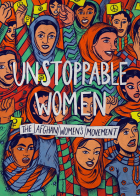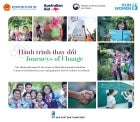1 - 7 of 7 Results
Date:
UN Women is closely examining the opportunities and challenges for lesbian, gay, bisexual, transgender, gender diverse, intersex, and queer (LGBTIQ+) persons’ full equality and inclusion in electoral processes in 2024 and beyond.
Date:
This submission on electoral participation and sexual orientation and gender identity closely examines the opportunities and challenges for lesbian, gay, bisexual, transgender, gender diverse, intersex, and queer (LGBTIQ+) persons’ full equality and inclusion in electoral processes.
Date:
UN Women Afghanistan commissioned this graphic novel, co-produced by Afghan women, to bring to life Afghan women’s powerful advocacy and incredible resilience in the most oppressive circumstances. Stories of loss reverberate throughout Afghanistan. But there is also hope even in the face of such loss. Afghan women don’t accept the restrictions imposed on their rights. Afghan women will not give up. They are unstoppable.
Date:
Ending discrimination and exclusion is core to the 2030 Agenda for Sustainable Development and Leaving No One Behind. Now is the time to make a conscious choice for better representation. Read the updated checklist on how to make your panels and events diverse and inclusive.
Date:
The report has been written by the Institute for Social Development Studies (ISDS) and the United Nations Entity for Gender Equality and the Empowerment of Women in Viet Nam (UN Women) while Viet Nam is rushing to complete the ‘Master Plan on Socio-economic Development of Ethnic Minorities and Mountainous Areas 2021-2030’. This study also confirms that positive changes in public administration reform, such as the one-stop-shop mechanism, digital public services, and infrastructure improvements are necessary
Date:
This photobook is developed to share the typical journey of change of selected teachers and students who joined efforts to reduce gender-based violence in schools. These courageous teachers and students participated in piloting the Toolkit “Connect with respect: preventing gender-based violence in schools: Classroom Programme for Students in Early Secondary School (age 11-14)”, which was jointly implemented by the Department for Political Education and Students Affairs, Ministry of Education and Training (PESAD-MOET) and the United Nations Entity for Gender Equality and the Empowerment of Women (UNWomen) in Viet Nam, from end of 2018 to mid of 2020, in 5 secondary schools at 5 provinces.
Date:
It cannot be stressed enough that violence against women and girls continues to be one of the most pervasive human rights violations in the world. It acts as both a cause and a consequence of gender inequality, and ranges in impact from adverse effects on the health, safety, productivity and overall well-being of women and girls, to impeding the realization of their rights and contribution to society at large. Despite decades of concerted efforts, at the global, regional and local levels.



![[cover]](/sites/default/files/styles/search_image_140px/public/2023-03/bd-Diversity-in-Dialogue-II-new-2023-960px.jpg?itok=Lzxmk8Mq)
![[cover]](/sites/default/files/styles/search_image_140px/public/2022-06/vn-ISDS_Report_EMW-to-PAS_Full-Report_EN-cover-1679px.jpg?itok=eTJrokzc)

![[cover]](/sites/default/files/styles/search_image_140px/public/Field%20Office%20ESEAsia/Images/2021/11/ap-TheBigConversation-MediaHandbook-compressed-1679px.jpg?itok=hzEAzB87)